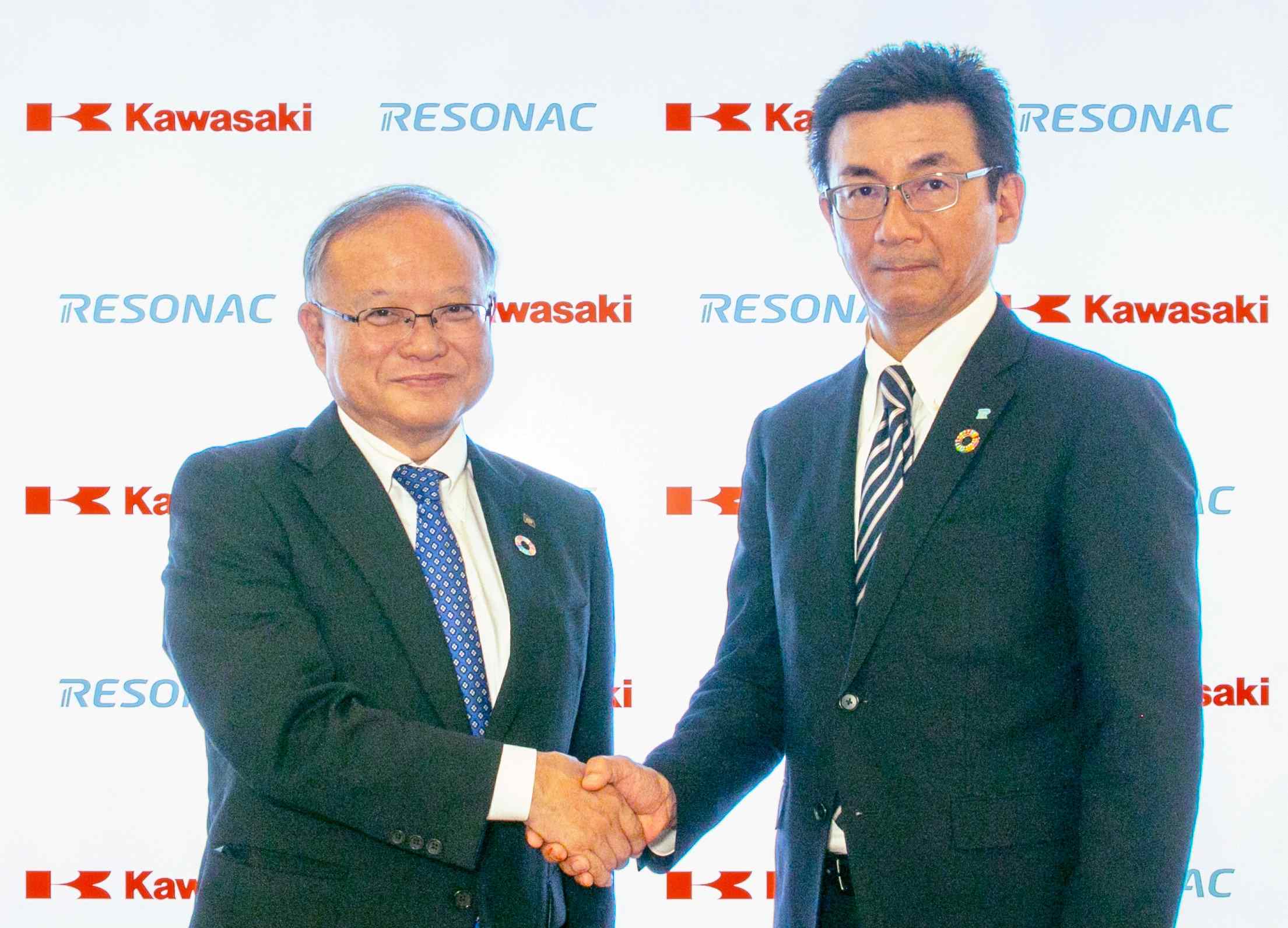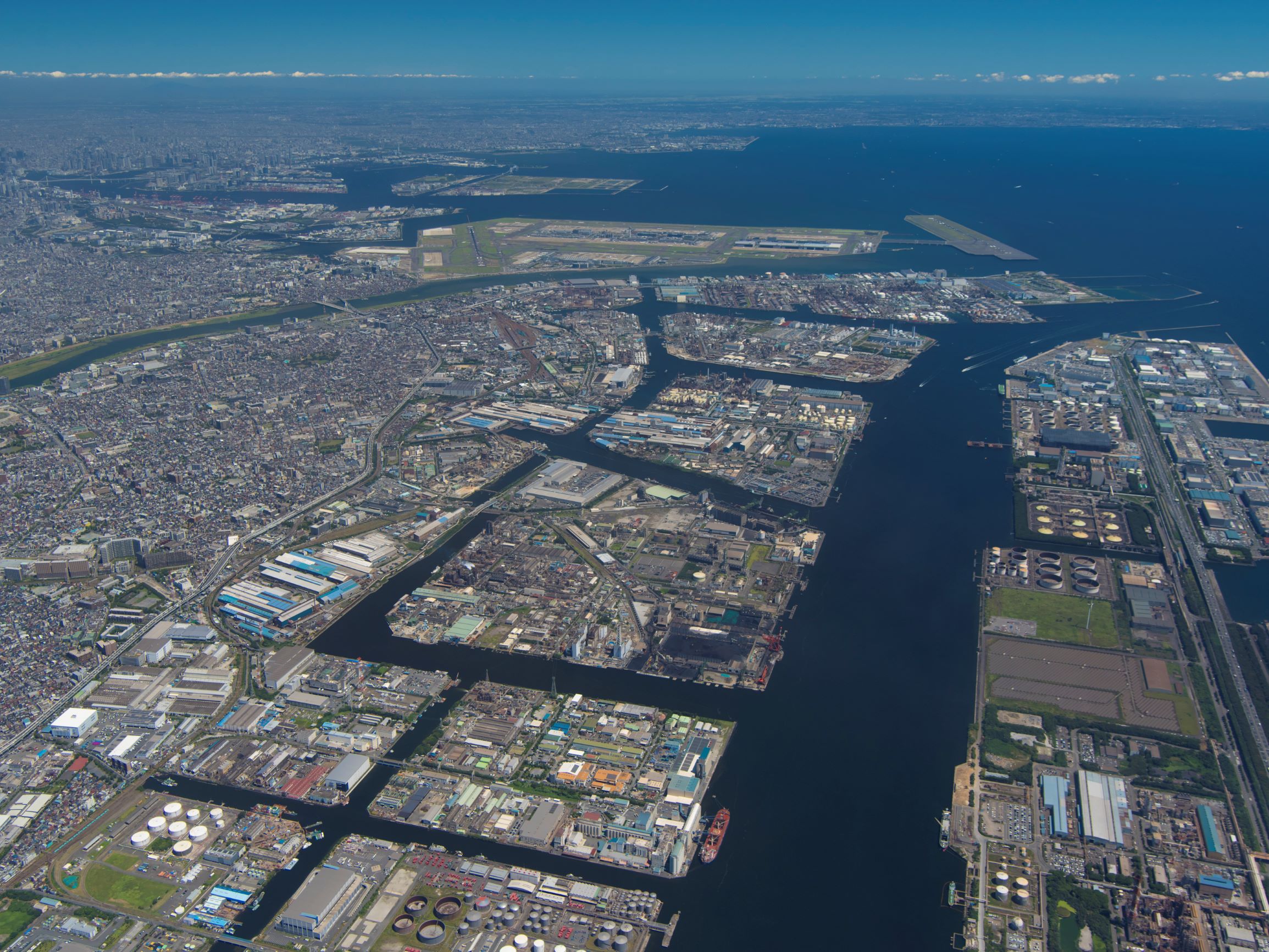Resonac and Kawasaki Conclude “Memorandum of Understanding on Cooperation in Development of Hydrogen Power Generation Business in Kawasaki Area”
October 17, 2023
Resonac Holdings Corporation
Kawasaki Heavy Industries, Ltd.
On October 17, 2023, Resonac Corporation (President and CEO: Hidehito Takahashi, hereinafter “Resonac”) and Kawasaki Heavy Industries, Ltd. (Representative Director; President and CEO: Yasuhiko Hashimoto, hereinafter “Kawasaki”) concluded “Memorandum of Understanding on Cooperation in Development of Hydrogen Power Generation Business in Kawasaki Area” (hereinafter “the MOU”), which aims to make plans for active use of hydrogen in about 2030.

Left) Eiichi Harada, Managing Executive Officer, General Manager, Hydrogen Strategy Division, Kawasaki Heavy Industries, Ltd. Right) Satoshi Hara, Councilor, General Manager, Basic Chemicals Business Unit, Resonac Corporation
Resonac and Kawasaki concluded the MOU intending to promote decarbonization by starting up a hydrogen power generation business at Resonac’s Kawasaki Plant in about 2030, when the international supply chain of liquefied hydrogen is expected to be established. The new hydrogen power plant is planned to have a generating capacity of 100 megawatts or more, and is expected to reduce CO2 emission by 700,000 tons or more* per year. Electricity generated by the hydrogen power plant will be partially utilized by Resonac and Kawasaki, and the rest of the electricity will be sold in the market as clean energy.
*This calculation is based on “Results of evaluation of the progress in global warming mitigation measures taken in the electric power industry” (p36 of reference materials) published by the Ministry of the Environment on July 14, 2020. (Japanese version only)
As the next-generation fuel contributing to the decarbonization of society, hydrogen is attracting people’s attention all over the world because it does not emit CO2 when it is burned. The international supply chain of hydrogen is expected to be established in about 2030. To cope with such steady progress in the supply side of hydrogen, the industrial world must investigate the usage of a large quantity of hydrogen that is expected to be supplied.
In the coastal area of Kawasaki City, the construction of a base to receive liquefied hydrogen is planned as a part of the “Liquefied Hydrogen Supply Chain Commercialization Demonstration Project” (hereinafter “demonstration project”) which has been formed under the framework of Green Innovation Fund Projects sponsored by the New Energy and Industrial Technology Development Organization (NEDO). This demonstration project was initiated as an advanced project aiming to promote the use of hydrogen. Under such circumstances, Resonac and Kawasaki started to consider cooperative work to launch hydrogen power generation business at Resonac’s Kawasaki Plant, which is located in the coastal area of Kawasaki City, Kanagawa Prefecture, where construction of the hydrogen receiving site is expected.
The Resonac Group is a group of chemical companies that produces and sells products related to semiconductor and electronic materials, mobility, innovation-enabling materials, chemicals, etc. The Group has a wide variety of materials and advanced material technologies applicable to midstream to downstream supply chains of various products. As a “co-creative chemical company,” Resonac aims to continue growing and enhance its corporate value through co-creation. In 2021, the Resonac Group announced in its Long-term Vision that the Group would aim to reduce its GHG emission in 2030 by 30% from the level of 2013. To achieve this target, the Group has been thoroughly streamlining its operation, improving business efficiency, reducing energy use, and substituting gas for other energy sources. Furthermore, the Resonac Group aims to achieve carbon neutrality by 2050 through the introduction of clean fuels including hydrogen.
Since 2010, Kawasaki has been paying special attention to hydrogen which is expected to be a surefire measure to achieve carbon neutrality, and developing technologies to support every phase of the liquefied hydrogen supply chain from production to transportation, storage, and utilization. In 2018, Kawasaki and its partners achieved a supply of electricity and heat generated by a 100% hydrogen-fueled gas turbine in an urban area for the first time in the world. In February 2022, Kawasaki and its partners completed the transportation and cargo handling of liquefied hydrogen between Japan and Australia by utilizing the world’s first liquefied hydrogen carrier, the SUISO FRONTIER, constructed by Kawasaki, thereby demonstrating the feasibility of the establishment of liquefied-hydrogen supply chain. In 2021, Kawasaki established a subsidiary, Japan Suiso Energy, Ltd. (JSE). Nowadays, with JSE as the central figure, the Kawasaki Group is striving to demonstrate the commercial feasibility of liquefied-hydrogen marine transportation technology by 2030.
The Kawasaki area, where Resonac’s Kawasaki Plant is located, is a coastal industrial zone. Therefore, the Kawasaki area is an ideal place to establish hydrogen-handling facilities that will accept large-quantity seaborne supplies of liquefied hydrogen. By making the most of the geographical advantage of the Kawasaki area, Resonac and Kawasaki will investigate and develop a business scheme, specifications of hydrogen-fueled power generation system, and the way to supply hydrogen, aiming to establish hydrogen power generation business, which will consume a large quantity of hydrogen, at Resonac’s Kawasaki Plant.
Based on the MOU, Resonac and Kawasaki will strive to launch hydrogen power generation in society, thereby contributing to the realization of clean electricity supply in the Kawasaki area in about 2030 and carbon neutrality of Japan in the future.

[Issues to be investigated under the provisions of the MOU]
(1) Business scheme for hydrogen power generation in the Kawasaki area
(2) Specifications of equipment for hydrogen power generation, how to cope with rules and regulations about hydrogen power generation, and contents of contracts about hydrogen power generation
(3) Good use of support programs for hydrogen power generation provided by the government
(4) Scheme for the procurement of fuel
[Comments by executives of Resonac and Kawasaki]
Comment by Satoshi Hara, Councilor, General Manager, Basic Chemicals Business Unit, Resonac Corporation:
“As the first Independent Power Producer (IPP) in Japan, Resonac has been operating power generation business for many years by utilizing its thermal power plant located in Kawasaki Plant. The launch of the hydrogen power generation business will be a turning point for Resonac. As you know, Kawasaki has been paying special attention to hydrogen fuel, and has accumulated technical expertise in hydrogen power generation. Through co-creation which is expected to be realized under the partnership with Kawasaki, Resonac aims to fulfill the hopes of the public for power supply with a clean energy source which will realize carbon neutrality, and contribute to the spread of hydrogen fuel.”
Comment by Eiichi Harada, Managing Executive Officer, General Manager, Hydrogen Strategy Division, Kawasaki Heavy Industries, Ltd.:
“Utilization of hydrogen in the power generation sector, which is now emitting 40% of the total CO2 emission of Japan, will contribute greatly to the realization of carbon neutrality. We are very glad to cooperate with Resonac in the investigation into the social implementation of hydrogen power generation. The conclusion of the MOU will enable Kawasaki to contribute to the early realization of the supply of clean energy and carbon neutral society.”
For further information, contact
Brand Communication Department
